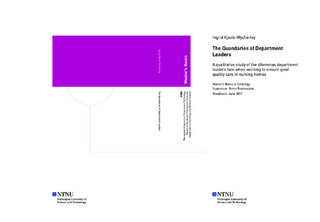| dc.description.abstract | This Masters Thesis is concerned with developments in Norwegian society which affect the way its nursing homes are organised. These developments are ones that department leaders of nursing homes must deal with. The research question is therefore: “What challenges do department leaders face when trying to motivate employees to do a good job, to give good care and create a quality care service?” The backdrop to this is the rapidly growing demands of an aging population and the reforms that have been introduced in accordance with New Public Management (NPM), with the goal of increasing productivity and efficiency, as well as decreasing financial cost. To investigate this, the qualitative research method has been used. Four department leaders have been interviewed, as well as two district leaders (who are ‘above’ the department leaders), and six care-workers (who are ‘below’ the department leaders). Through narratives obtained from care-workers, department leaders and district leaders, the dilemmas that department leaders faced when trying to ensure sufficient competence ‘on the floor’, came to light.
This research finds that the introduction of elements connected to NPM has resulted in certain mechanisms; including budget parameters becoming ‘sacred’, leading to department leaders organising the nursing home through ‘budgetary and transactional lenses’. This resulted in them having a tendency to view employees as an expense to be economised with rather than a resource to be invested in, thereby creating an ‘easy exit’ for employees. In addition to this department leaders are removed from ‘the floor’, and are therefore unable to see the ramifications that decisions made through these ‘budgetary and transactional lenses’ have for employees’ wellbeing, and the quality of the care service department leaders are responsible for.
The findings in this research can serve as an eye-opener for department leaders of nursing homes, making them actively aware of the dilemmas that can present themselves in nursing homes. | nb_NO |
